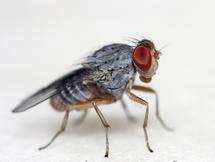February 22, 2013 report
Fruit flies medicate their larvae with alcohol

(Phys.org)—A new study in the U.S. shows that fruit flies lay their eggs on a food source with a high alcohol content if they see parasitic wasps in the area, instead of a non-alcohol food.
Many species of fruit fly (Drosophila) have developed a tolerance for alcohol since they generally feed on decomposing fruits, which can contain up to around 16 percent alcohol, produced by natural yeasts. On the other hand, alcohol is toxic to wasps that parasitize fruit fly larvae (Leptopilina heterotoma and other species). Researchers Balint Kacsoh of Emory University in Georgia and colleagues, had previously shown that D. melanogaster larvae will choose to feed on decomposing fruits to the extent of consuming normally toxic quantities if they are parasitized by wasps.
The tiny female wasps parasitize the fly larvae by laying their eggs inside their bodies. When they hatch, the wasp larvae consume the fly larvae from the inside, often killing them. When the fly larvae consumed alcohol, the alcohol would often kill the parasite. Other parasitic wasps parasitize fruit flies during their pupal stage of development.
In the new study the researchers provided fruit flies with two food sources, one of which contained six percent alcohol, and one with no alcohol. They then observed the behavior of the fruit flies with and without parasitic wasps of various types being present.
They found that in the absence of the the female wasps, the flies tended to prefer (60%) the food source with no alcohol, and these larvae developed into adults at a higher rate. When female wasps were present the flies had a clear preference (90%) for depositing their eggs on the food source containing alcohol. The changed behavior ensured the hatched larvae (maggots) had a ready source of alcohol available to consume, and these larvae fared better than those laid on the no-alcohol food source. The fruit flies' response to the presence of the parasitic wasps is an example of a behavioral immune response.
The fruit flies responded only to seeing the female wasps and did not alter their behavior if only males were present or if other types of parasitic wasps, such as those that parasitize pupae rather than larvae were present. The response required a functioning visual system but mutant flies with no ability to smell still adopted the behavior.
These findings demonstrate that the female flies can visually distinguish between the different types and genders of wasps, even though they had been bred in wasp-free laboratory environments for many generations. The researchers also tried cutting short the antennae of the males (which are longer than in female wasps), but the fruit flies were not fooled and continued to ignore their presence.
The study also showed the behavioral immune response continued for several days after the wasps were removed, and the adults continued to prefer the alcohol-soaked food source even if the alcohol rate was increased to as high as 16 percent.
The team identified neuropeptide F as the controller of the behavioral immune response in D. melanogaster, and thought the response has probably evolved in other species of fruit fly as well. They tested other species and found a correlation between the extent of the modified behavior and the species' tolerance to alcohol. In species with no tolerance for alcohol the eggs were always laid on the food source without alcohol.
The studies show the fruit fly larvae can medicate themselves, and in species that tolerate alcohol well, their mothers take pains to ensure their medication (alcohol) is available to the larvae when they hatch. The new study also identified a gene involved in forming the long-term memory, and found the same gene is also involved in tolerance for alcohol.
The paper is to be published in the journal Science on 22nd February.
More information: Fruit Flies Medicate Offspring After Seeing Parasites, Science 22 February 2013: Vol. 339 no. 6122 pp. 947-950. DOI: 10.1126/science.1229625
ABSTRACT
Hosts have numerous defenses against parasites, of which behavioral immune responses are an important but underappreciated component. Here we describe a behavioral immune response that Drosophila melanogaster uses against endoparasitoid wasps. We found that when flies see wasps, they switch to laying eggs in alcohol-laden food sources that protect hatched larvae from infection. This change in oviposition behavior, mediated by neuropeptide F, is retained long after wasps are removed. Flies respond to diverse female larval endoparasitoids but not to males or pupal endoparasitoids, showing that they maintain specific wasp search images. Furthermore, the response evolved multiple times across the genus Drosophila. Our data reveal a behavioral immune response based on anticipatory medication of offspring and outline a nonassociative memory paradigm based on innate parasite recognition by the host.
Journal information: Science
© 2013 Phys.org
















